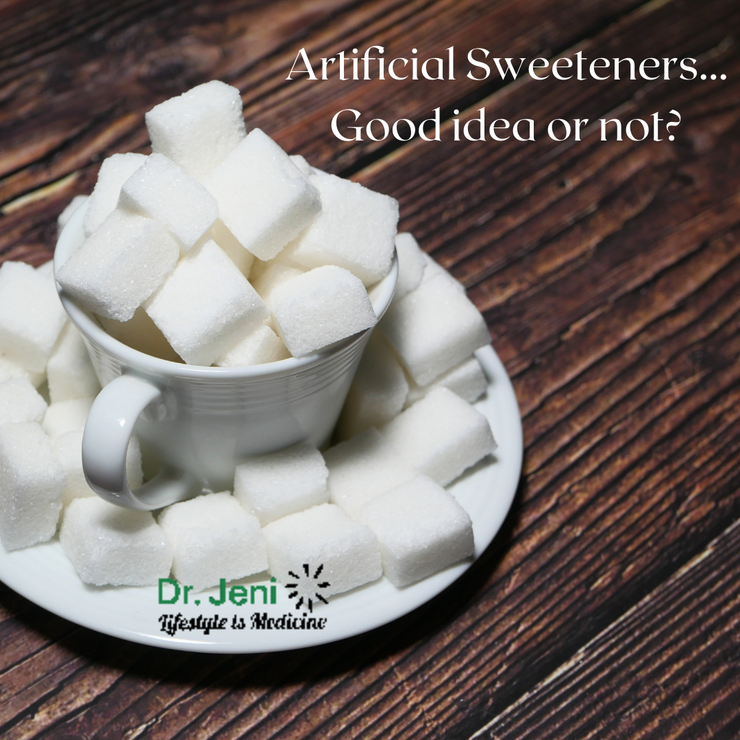Chance are that you have heard that sugar is a huge problem. It increases risk for diabetes, can cause cavities in your teeth, and is a big player in the obesity epidemic we are seeing. This isn’t really news… But, what do we do about this problem?
One “solution” that seems to be popping up is to use something to replace sugar. That “something” is quite often some kind of artificial sweetener. If you read labels, you will be looking for things like : Aspartame, Sucralose, Splenda, NutraSweet, Saccharine, Acesulfame potassium-K (ace K), just to name a few. When you see these things, you will notice the the sugar content is lower, which may seem like a good thing. But, are these actually a good trade?
Studies have linked the 6 popular artificial sweeteners mentioned above (aspartame, sucralose, saccharine, neotame, advantame and acesulfame potassium-k (ace-k) to “adverse effects such as cancer, weight gain, metabolic disorders, type-2 diabetes and alteration of gut microbiota activity.”[1] This might lead you to re-think whether you want you or your family members to eat or drink these things! In fact, you might be wondering how these things could be linked to the very things they are trying to prevent, like type-2 diabetes.
I find it ironic that these artificial sweeteners actually raise your insulin, or blood sugar, levels the same way that sugar does. They also feed the addiction to sugar that so many people are trying to break. So, by consuming these artificial sweeteners, we may actually be making the problem worse! According to the Journal of Public health and Nutrition, Artificial Sweetener use “has been reported to be associated with an increased risk of weight gain, obesity and type II diabetes”.[2] Isn’t that the very thing we are trying to avoid?
These substances are in so many things labeled as “sugar free” or “reduced sugar”. Things like fruit cups, sports drinks, fruit drinks, even bread. We feed to them to ourselves and our children. My opinion is that we are better off to avoid these products. I do not feel that the risk is worth taking.
So, what do we do if we are trying to limit sugar in our diets? The first thing we can do is to eat less of it. I know that seems grossly over-simplified, but stay with me for a minute. Eating less will actually reduce your cravings for sugar. It’s a feedback loop. Eat more, crave more. Eat less, crave less. Read labels and choose products without added sugar. Choose foods that are unprocessed and in their natural state. Organic, pastured, grass-fed meats and eggs, nuts, healthy fats, lots of veggies and a little bit of fruit as your sweetness.
The low fat diet was made popular many years ago, but I think this has actually increased sugar consumption tremendously. If you cut out fat, there are only two other choices. 1) Protein, which can only safely be consumed in certain quantities. Over eating protein can be hard on the kidneys. 2) Carbohydrates. I think that what has happened is that as people cut back on fat in their diet, they eat more carbohydrates. These are often high-sugar, high-glycemic foods that create major health problems. So, don’t be scared of healthy fats. They will help you feel full and satisfied, which helps cut down on sugar cravings.
Alternatives to sugar like local honey and stevia (which is an herb, not an artificial sweetener) can also be used in very small quantities to replace sugar. Just remember, that the idea is to create an environment where we are not feeding the “sweet monster”, so the less of these you can consume the better.
I know that reducing sugar is a big deal, and that it can be hard. I also know that it can have profound positive effects on your health. I do not believe that replacing sugar with artificial sweeteners is not a great idea for all of the reasons listed above.
Here is to getting better one day at a time!
Dr. Jeni
[1] Sanyaolu A, Marinkovic A, Gosse J,et al. Artificial sweeteners and their association with Diabetes: A review. J Pub Health Catalog 87 2018;1(4):86-88.
[2] Harpaz, D.; Yeo, L.P.; Cecchini, F.; Koon, T.H.P.; Kushmaro, A.; Tok, A.I.Y.; Marks, R.S.; Eltzov, E. Measuring Artificial Sweeteners Toxicity Using a Bioluminescent Bacterial Panel. Molecules 2018, 23, 2454.


